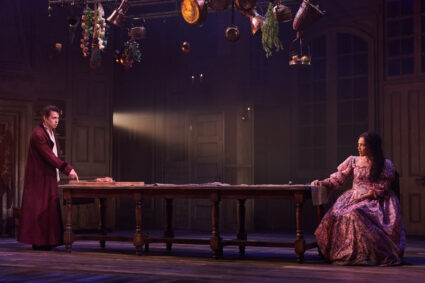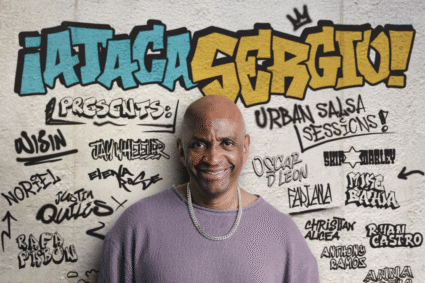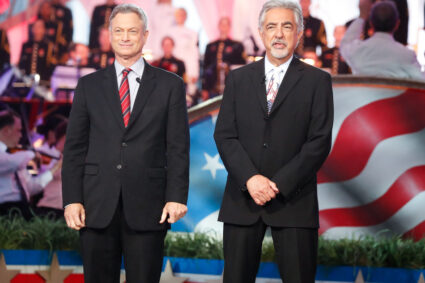
(Photo Credit: Ann Cutting)
Today’s guest on THE INTERVUE is making her first concert to the Nation’s Capital in over sixteen years and is considered one of the greatest Canadian artists of all time.
Her eclectic Celtic blend of pop, folk and world music has sold over 14 million albums worldwide. Her recordings have achieved Gold, Platinum and multi-Platinum status in 15 countries on four continents. She has twice been nominated for a GRAMMY Award and has won two Juno Awards, as well as a Billboard International Achievement Award. Recently, she was inducted into the Canadian Songwriter’s Hall of Fame in March 2023.
Let’s welcome back to DC, Loreena McKennitt!
My first question to you is, you just performed for the first time in the states in Portland, ME, just couple days ago. And now you’re in Burlington, VT. How does it feel to be back on tour in the United States after all these years?
It’s great to get back out on the road. After I’m in New York, we have toured some places in 2019. I think the last time we’re in the state might have been the fall of 2016. So, it’s certainly been a long time here. And it’s like, getting together with friends, and seeing folks and so it’s good.
The tour, “The Visit Revisited Tour: The next Chapter”, is commemorating the 32nd anniversary of your Juno Award winning album, which is so amazing. In fact, I was just listening to it all week to get my mindset on the visit. I want you to talk about all those years ago, creating this wonderful album that you’re bringing back to life on this special tour?
It was exciting and nerve wracking. At the same time, I had produced three recordings prior to that. But they hadn’t been distributed. As far and wide as “The Visit” was. This was the first recording that was distributed through the Warner Music Group. I was signed a licensing deal with Warner Music Canada, and then it came to the rest of the morning music territories through that door. There was a bit of an illness to produce something that that was going to work. It’s not like what I had done before then was massively commercial but that isn’t really what I do. The record company did see that even the previous recordings for selling quite well, even just as an independent.
It was also I had enough financial resources. I’ve always financed my own recordings. I’ve never borrowed money from the record company. I had complete autonomy to do what I like. And that was exciting to bring in some of the musicians from Toronto at the time. And explore some different fusion ideas for the Celts and other cultures kind of thing. Or going to repertoire where there was some even gentle Celtic connection, such as the Shakespeare piece “Cymbeline” from Shakespeare’s play. It was a mixture of excitement and trepidation.
While I’m so glad here and I’m glad that you mentioned “Cymbeline” because that is one of my favorite pieces. I remember listening to it when I was in my teens and grew up. So, thank you for creating that wonderful, beautiful peace. For those who haven’t heard “The Visit” in a long time, what songs on the album would you recommend for them to listen to and understand the beautiful masterpiece that is to visit?
Well, “The Visit” have resonances for different people. I know that for some people the traditional piece called “Bonny Portmore” is quite a favorite. It’s a piece that is probably over 100 years old, and the men are cutting down a very particular magnificent tree in Ireland and it’s really having a kind of contemporary role because some of the lyrics refer to the birds “where shall we shelter, where shall we sleep”. There’s an environmental dimension to that and just a very beautiful, evocative melody.
I also set “The Lady of Shallot” Tennyson’s poem to music. I got it down to I don’t know about twelve verses or something. You know it leads more to King Arthur and those kinds of Celtic connections. There’s another piece called “The Old Ways”, which I wrote very much inspired by a visit that I been to the west coast of Ireland, in the early 80s. I was reflecting on how some of the traditions were being lost effortless in an era of such incredible change.
There’s another piece called “Tango to Evora”, which I composed for a series of documentaries for the National Film Board of Canada called “Women & Religion and Spirituality”. And then when I was putting this, this recording together, I rearranged it and did this version of it. But it went on to be covered by people from Greece, Turkey, & Israel. I think some other places as well. It’s a piece that kind of found it a home in different places than just in my recording. That of course, there was “Cymbeline”.
“Greensleeves” is a piece that we just accidentally did when we were working on an artist development deal in 1988 with Polygram. We were working with a particular piece, and then the phone rang, and the engineer had to take a phone call. So, the musicians and I were on the studio floor, and I just said, while he’s on the phone, “why don’t we just muck around? Why don’t we do a version of Greensleeves?” We mucked around. Then the engineer got off the phone and he say “now that sounds interesting. Why don’t we just record that for fun”. So, we recorded it straight to the floor. Then I put it to the side and went on to do my third recording. But I had that piece already in the can, so to speak. So, it’s a real motley collection of songs.
That is sensational. And in fact, you just answered one of my next questions. I want to talk about your most recent award, because you were inducted into the Canadian Songwriters Hall of Fame back on March 8th, which was International Women’s Day, very good timing. And you got to perform “Stolen Child” with Brian Hughes on guitar, and who marched on violin. And the Hall of Fame chairman of the board, Stan Meissner said, and he described you as “a storyteller who can weave through eras, cultures, and transcend boundaries”. Now, after hearing this at the time, and once again now, what does hearing this praise mean to you?
I mean, it fairly accurately represents what I’ve done. I’d love to see and knew what I was doing but I didn’t. I kind of followed strands of interest in fascination and scrounge around in corners of history in the preparation for each recording. I would also travel a great deal traveled through Spain, Morocco, Europe, Turkey, Mongolia, China, and Russia. And all those travels would inform my creative path. I’m always interested in where history and geography connect and perhaps what contemporary elements there might be for now, in some of those what I was learning. So that’s really all I can think of with respect to that quote and I love the storytelling.
You’ve spoken like a true class world traveler. Of all the places that you visited to help you put words to what you see and hear of the different cultures, what place of all of them spoke to you the most?
That’s an impossible question. There’s so many because either they’re beautiful, rich, intriguing or interesting things in various places. Without question for me, not coming from a more Eastern culture being in Turkey and Morocco for sure. Even the trip across Siberia. It was totally a pleasure trek to have by any stretch, but it was quite challenging in some ways. I went by myself on the Siberian Express. And I got on in on the train in Vladivostok on one Sunday night and got off to Moscow the following Sunday. In December, it’s very cold, and so on. It was incredibly fascinating. It depends on what one is looking for out in air travel. Almost everywhere I went, I find things are so interesting.
Absolutely, a trek to Siberia would definitely bring some inspiration to anybody. What are you looking forward to coming back to =the nation’s capital and performing at the historic Warner Theater?
I remember us performing in Washington before. One of the last times was I think around 2007 or so. And after we loaded out, there was four buses and two trucks with which from my scene is big. It was a beautiful evening and we’re just sitting outside afterwards. And some people were playing guitars and I just remember the whole setting was really nice. It’s always exciting to go to capital cities. We would always follow along on the things that happen in the country. We’re really looking forward; we’ve always thought the audiences in Washington to be very embracing. And that’s really great.
Well, I’m so glad to hear that my fellow Washingtonians are definitely embracing. Since I asked you, what are you looking forward to with the concert, what can you expect our DC audience especially those who never been to your concert?
I’m traveling with some longtime musicians like guitarist Brian Hughes, Caroline Lavelle on cello, Hugh Marsh on violin and bass player from Britain, Dudley Phillips. I’m not traveling with a lot of the eclectic instruments this time, like we did the last time we went to Washington. We’re going to perform the whole “Visit” from top to bottom in the second set. And we will also release another recording… actually release three. One that’s more of like a studio recording and two special projects.
Since we’re here so we’re going to be performing some pieces from the “Lost Souls” studio recording. And then, we recorded this special Christmas winter performance from a couple of years ago, just in the thick of the pandemic, called “Under a Winter’s Moon”. It’s a kind of eclectic project that has this Christmas winter, indigenous, Celtic spoken word.
This past summer, I felt it was time to kind of go back and do some of the original traditional material that got me inspired down this path. We got together with them, A Celtic group of musicians that lived locally and we played at some folk festivals. We’re going to really start it on the road back home but we’re going to perform one of those pieces on this tour. That’s what folks can expect.
Loreena McKennitt perform at the Warner Theatre this Monday October 23rd for her “The Visit Revisited Tour: The Next Chapter”. Tickets can be purchased through LiveNation. Click HERE to purchase your tickets!


